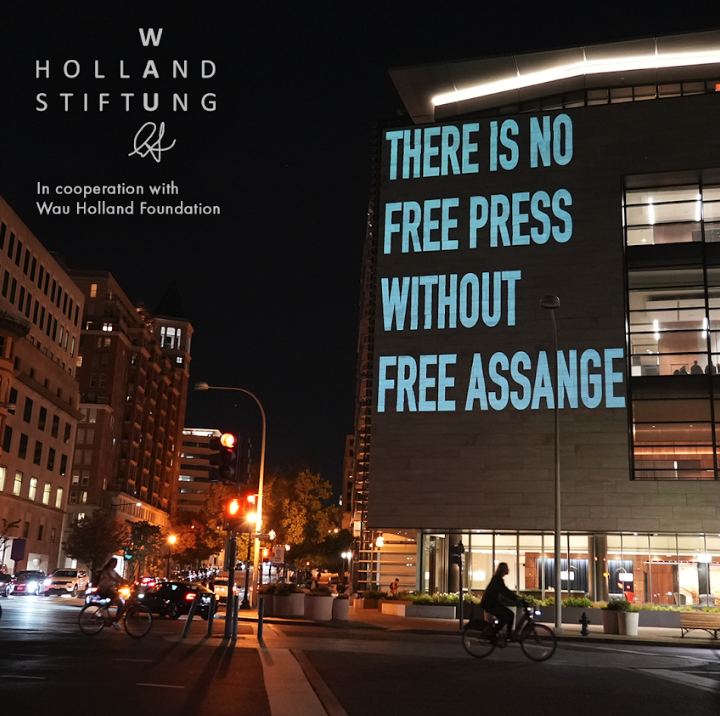February 14, 2024 — With less than a week to go until Julian Assange’s final bid to appeal his extradition from the United Kingdom in a London courtroom, press freedom and human rights organizations are once again sounding the alarm over Assange’s prosecution and the threat it poses not only to Assange’s due process and First Amendment rights but to investigative journalists around the world.
On February 14, the International Federation of Journalists and the European Federation of Journalists issued a joint statement, in which they warned that ”the ongoing prosecution of Julian Assange jeopardizes media freedom everywhere in the world.”
Dominique Pradalié, IFJ president says: “I have twice met with Julian Assange in Belmarsh and it is clear to me that he has suffered grievously for far too long. In April he will have spent five years in a British prison despite having been convicted of nothing. The actions for which the US is seeking prosecution are clearly journalistic. The conviction of Julian Assange would threaten us all”.
Maja Sever, EFJ president said: “Journalists and their unions have recognised since the outset that Julian Assange is being targeted for carrying out tasks that are the daily work of many journalists – seeking out a whistleblower and exposing criminality. We stand with journalists of every political persuasion and nationality and say that Assange should be freed at once”.
The same day, Reporters without Borders dispelled some of the most common misconceptions about Assange and his persecution.
Misconception: If I don’t believe Julian Assange is a journalist, I can’t defend him.
Correction: Many different views are held about Assange’s status as a journalist, a publisher, or a journalistic source, but what matters most is why Assange has been targeted and the implications of his extradition and prosecution. RSF defends Assange because of his contributions to journalism, as WikiLeaks’ publication of the leaked classified documents informed extensive public interest reporting around the world. His prosecution would have alarming implications for the future of journalism and would represent an unprecedented blow to press freedom.
Misconception: If Julian Assange is convicted, it won’t have a wider impact.
Correction: Assange’s conviction would impact the future of journalism around the world and all of our right to know. He would be the first publisher tried under the US Espionage Act, which lacks a public interest defence and is in dire need of reform. His conviction would pave the way for similar prosecutions of others who publish stories based on leaked classified information, setting a dangerous precedent for journalism. This would put many media organisations and journalists at risk, and create a distinct chilling effect on public interest reporting. The ultimate impact would be on the public’s right to know.
On February 13, Amnesty International issued a renewed warning: ‘Global media freedom at risk as Julian Assange back in UK court facing possible extradition to USA’
“The risk to publishers and investigative journalists around the world hangs in the balance. Should Julian Assange be sent to the US and prosecuted there, global media freedoms will be on trial, too,” said Julia Hall, Amnesty International’s expert on counter-terrorism and criminal justice in Europe.
“Assange will suffer personally from these politically-motivated charges and the worldwide media community will be on notice that they too are not safe. The public’s right to information about what their governments are doing in their name will be profoundly undermined. The US must drop the charges under the espionage act against Assange and bring an end to his arbitrary detention in the UK.”
On February 12, PEN International wrote, ‘Stop the Extradition and Release Julian Assange’
‘Using espionage laws to target journalists and publishers who disclose information in the public interest infringes fundamental rights of press freedom and freedom of expression, both safeguarded within the legal framework of the UK. Assange’s case is politically motivated and challenges the core of investigative journalism and democratic principles, necessitating the protection of these rights for the broader preservation of a free and responsible press. PEN International and PEN Centres around the world have repeatedly called on the US authorities to drop the charges against Assange and to withdraw their extradition request. With the prospect of his extradition alarmingly close, we call on the UK authorities to urgently refrain from extraditing him and to release him from prison immediately’, said Burhan Sonmez, PEN International President.
On February 6, the UN Special Rapporteur on Torture urged the UK government to halt imminent extradition of Julian Assange
“The risk of being placed in prolonged solitary confinement, despite his precarious mental health status, and to receive a potentially disproportionate sentence raises questions as to whether Mr. Assange’s extradition to the United States would be compatible with the United Kingdom’s international human rights obligations, particularly under article 7 of the International Covenant on Civil and Political Rights, as well as respective articles 3 of the UN Convention against Torture and the European Convention on Human Rights.”

